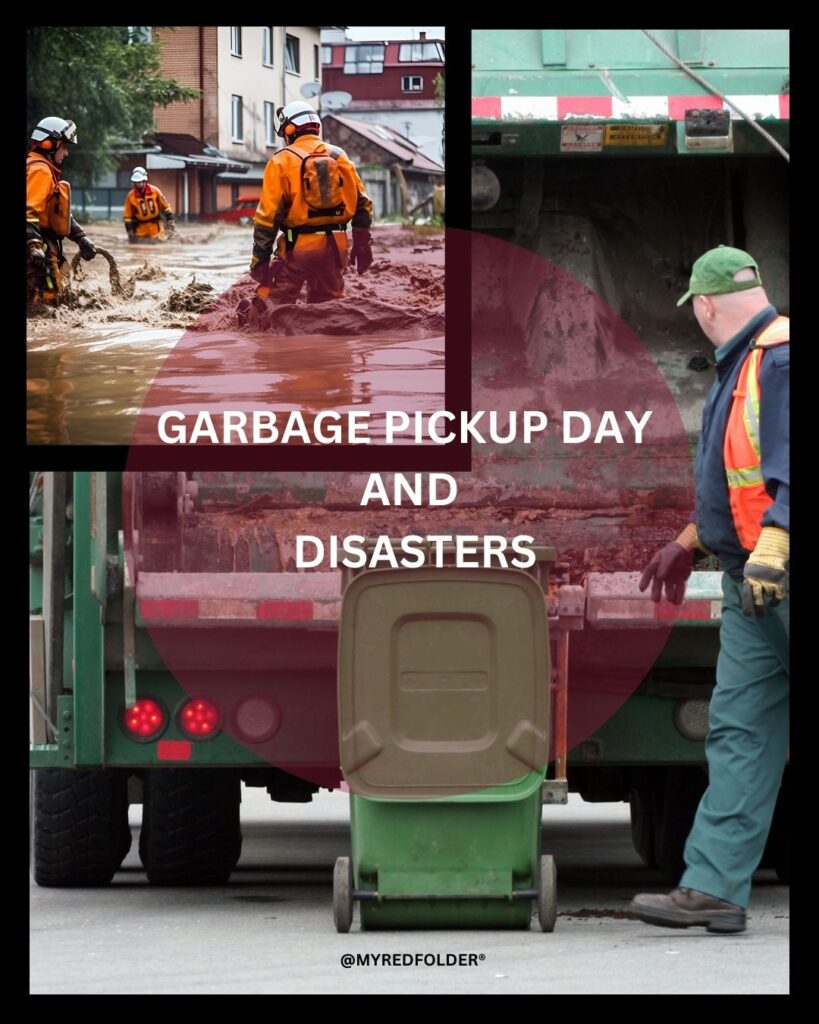Earthquakes, Fire, Floods, Health, Hurricane, Insurance, NEPTA NEWS
Garbage Pickup & Disasters: The Overlooked Crisis 🚨
In the U.S., garbage pickup day is paramount to public health, cleanliness, the beauty of our communities, and even our overall happiness and mental well-being. For most of us, we don’t think twice about the entire process—pickup, compaction, separation, storage, or disposal. We simply expect our garbage to be whisked away with the same certainty as the sun rising each day.
But what happens when disaster strikes?
🦠 Health Risks – Rotting trash breeds disease.
🚧 Blocked Roads – Delays emergency response.
😞 Mental Strain – Piled-up waste adds stress.
🌎 Environmental Harm – Pollutes water & soil.
The Hidden Crisis: Waste Management During a Disaster
During a disaster situation, whether it’s a hurricane, flood, earthquake, or other catastrophic event, essential services like trash collection can be severely impacted. Depending on the scale of the disaster, there may be no garbage retrieval for weeks—or even months. And if not planned for carefully, the absence of routine waste removal can lead to a cascade of serious problems, including:
- Public Health Hazards
With no garbage pickup, waste begins to pile up quickly—both inside homes and on streets. Rotting food, contaminated packaging, and hazardous materials create a breeding ground for bacteria, rodents, and disease-carrying insects like mosquitoes and flies. This can lead to the spread of illnesses such as dysentery, respiratory infections, and vector-borne diseases.
- Blocked Roads and Delayed Emergency Response
In the aftermath of a disaster, roads are already littered with fallen trees, debris, and damaged infrastructure. Piled-up trash only worsens the problem, making it difficult for first responders to navigate streets and deliver aid. In some cases, uncollected waste can even block access to medical facilities, slowing down critical emergency care.
- Psychological and Emotional Stress
Disasters take a toll on mental health, and the sight (and smell) of mounting garbage can compound stress and anxiety. Imagine trying to recover from a disaster while living among heaps of decaying waste. The lack of cleanliness can make an already overwhelming situation feel even more hopeless, adding to the emotional burden on survivors.
- Environmental Contamination
Without proper disposal, waste can leach dangerous chemicals into the soil and water supply. Floodwaters can carry waste into rivers and lakes, spreading pollutants over large areas. In areas with damaged sewage systems, mixing trash with human waste can create an environmental nightmare.
- Increased Fire Hazards
In the wake of wildfires or severe storms, broken infrastructure and downed power lines increase the risk of accidental fires. Large amounts of flammable waste left unattended can quickly ignite, leading to secondary fires that put even more lives and property at risk.
The Unsung Heroes: Trash Collectors, First Responders, and Debris Cleanup Crews
While first responders such as firefighters, police officers, and paramedics receive well-deserved recognition, there is another group of heroes we often overlook—our sanitation workers and debris cleanup crews.
When disasters strike, they are among the first to restore a sense of normalcy. They work tirelessly to remove hazardous debris, clear roadways, and restart garbage collection under the most difficult circumstances. Without them, recovery would be significantly delayed, and public health risks would skyrocket.
So the next time you take out the trash and see it disappear like clockwork, take a moment to appreciate the people who make it happen. A simple “thank you” to your garbage collector can go a long way. And in the face of a disaster, let’s remember that their role is just as critical as any first responder.
Our clean, healthy communities depend on them.
Sanitation workers & cleanup crews are unsung heroes. Next time your trash is collected, take a moment to appreciate them! 🙌
Be Prepared with MYREDFOLDER®
In a disaster, knowing what to do before services are restored is crucial.
MYREDFOLDER® helps individuals and families stay organized with critical information at their fingertips. Don’t wait for a crisis—be ready for anything.
#MYREDFOLDER #DisasterPreparedness #ThankYouSanitationWorkers #CommunityHealth

